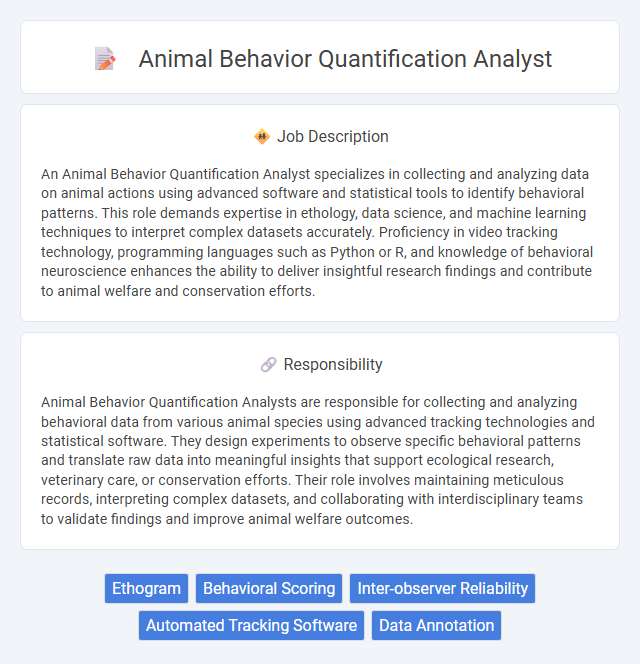
An Animal Behavior Quantification Analyst specializes in collecting and analyzing data on animal actions using advanced software and statistical tools to identify behavioral patterns. This role demands expertise in ethology, data science, and machine learning techniques to interpret complex datasets accurately. Proficiency in video tracking technology, programming languages such as Python or R, and knowledge of behavioral neuroscience enhances the ability to deliver insightful research findings and contribute to animal welfare and conservation efforts.
Individuals with strong analytical skills and a passion for animal behavior are likely to be suitable for the role of Animal Behavior Quantification Analyst. Those comfortable with data collection, statistical analysis, and interpreting behavioral patterns may find this job aligns well with their abilities. However, candidates who prefer less detailed or quantitative work might struggle to excel in this position.
Qualification
Expertise in ethology, behavioral science, or psychology is essential for an Animal Behavior Quantification Analyst, complemented by proficiency in statistical analysis software such as R, Python, or MATLAB. Strong skills in data collection methods, behavioral coding, and quantitative analysis of animal interactions are required, along with experience in using video analysis tools and automated tracking systems. A background in biology or veterinary science combined with advanced degrees or certifications in behavioral research enhances analytical accuracy and interpretation of complex behavioral datasets.
Responsibility
Animal Behavior Quantification Analysts are responsible for collecting and analyzing behavioral data from various animal species using advanced tracking technologies and statistical software. They design experiments to observe specific behavioral patterns and translate raw data into meaningful insights that support ecological research, veterinary care, or conservation efforts. Their role involves maintaining meticulous records, interpreting complex datasets, and collaborating with interdisciplinary teams to validate findings and improve animal welfare outcomes.
Benefit
The role of an Animal Behavior Quantification Analyst likely provides significant benefits such as the opportunity to contribute to wildlife conservation efforts and improve animal welfare through data-driven insights. Professionals in this position probably gain expertise in advanced statistical methods and software used to analyze behavior patterns, enhancing their technical skill set and career prospects. This job may offer collaborative work environments with researchers and conservationists, fostering professional growth and impactful scientific contributions.
Challenge
The challenge in an Animal Behavior Quantification Analyst role likely involves accurately interpreting complex animal behaviors through data analysis and advanced modeling techniques. Managing large datasets acquired from observational studies or sensor technologies may require precise coding skills and a deep understanding of ethology. This position probably demands continuous adaptation to new research methodologies and technological tools to ensure reliable behavior quantification.
Career Advancement
Animal Behavior Quantification Analysts leverage advanced data analysis and observational techniques to interpret complex behavioral patterns, positioning themselves for roles in research leadership and specialized wildlife consultancy. Expertise in quantitative methods and animal psychology opens pathways to academic appointments and influential positions within conservation organizations. Continuous skill enhancement in statistical software and behavioral modeling significantly accelerates career growth and professional recognition.
Key Terms
Ethogram
An Animal Behavior Quantification Analyst specializes in creating and interpreting ethograms to systematically record and categorize animal behaviors in research settings. Utilizing precise observational techniques and software tools, the analyst quantifies behavioral patterns to support studies in ethology, psychology, and conservation biology. Expertise in ethogram development enhances data accuracy, enabling researchers to identify behavioral trends and assess environmental or experimental impacts on animal activity.
Behavioral Scoring
Behavioral scoring in an Animal Behavior Quantification Analyst role involves systematically observing, categorizing, and recording animal actions to assess behavioral patterns accurately. Expertise in ethogram development and software tools like BORIS or Observer XT enables precise data collection and analysis for experimental reproducibility. Mastery of statistical methods supports the objective interpretation of behavioral metrics to inform research in fields such as neuroscience, ecology, and veterinary sciences.
Inter-observer Reliability
An Animal Behavior Quantification Analyst specializes in accurately measuring and interpreting animal actions using standardized observation protocols. Inter-observer reliability is a critical metric ensuring consistent data collection across multiple observers, minimizing variability and enhancing the validity of behavioral studies. Mastery in calculating and improving inter-observer reliability supports robust conclusions in ethology and applied animal behavior research.
Automated Tracking Software
Animal Behavior Quantification Analysts utilize automated tracking software to precisely monitor and analyze complex movements and interactions in various species. This technology enhances data accuracy by capturing real-time behavioral patterns, minimizing human error, and providing detailed metrics such as locomotion speed, spatial distribution, and social interactions. Expertise in software like EthoVision and DeepLabCut enables efficient processing of large datasets, facilitating advanced behavioral research and experimental reproducibility.
Data Annotation
Animal Behavior Quantification Analysts specialize in data annotation by systematically labeling and categorizing animal actions within video or sensor data sets to facilitate accurate behavioral analysis. They use advanced software tools and machine learning techniques to ensure high-quality, consistent annotations that enable researchers to decode complex behavioral patterns. Precise data annotation enhances the reliability of behavioral models, supporting studies in wildlife monitoring, neuroscience, and ethology.
 kuljobs.com
kuljobs.com